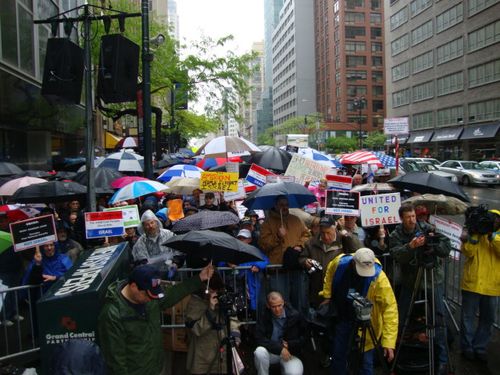
In order for Obama to fathom the Israeli-Palestinian conflict from our vantage point, he needs to be reached through the Jews and African-Americans supporting him.
In his speech before the U.S. Congress, Netanyahu did well telling, describing and illustrating the situation in Israel. Nonetheless, his words, sharp and exciting as they could be, only express the necessity of a vital Israeli PR campaign in the U.S. Because one speech, — even if it’s considered a smashing success, — cannot withstand Barack Obama’s firm views and the power of his influence.
Should we look in-depth into President Obama’s outlook, we’ll find that two underlying hindrances in its foundation do not allow the White House to promote a policy in the Middle East which would be consistent with the Israeli mise en scène.
First of all, since Obama had been elected thanks to the Jewish vote in the U.S., among other factors, he surrounded himself with liberal-Democratic American Jews, who possess a strong dovish stance concerning the goings-on in Israel. A majority of his advisers, Rahm Emmanuel among them, have long since already lost touch with the reality in Israel and built for themselves an ideal world of the vision-of-peace at any price, without having to experience firsthand the results of the complex and painful concessions required.
Second of all, belonging to the African-American community, President Barack Obama seems to look upon the Israeli-Palestinian conflict through the hundreds of years of oppression of the blacks by the whites in the U.S. A parallel that has nothing to do with the circumstances existing in Israel.
By the way, unlike him, George Bush, who did not ascend to presidency because of a considerable Jewish vote, was able to read the map and understand the processes in Israel in an immediate way. He was dealing with information which he got straight from the source and tended to give weight to the insights of Israeli leaders. The direct result of the position crystallized by President Bush was a realistic plan — the “road map” which demanded the dismantling of terror organizations before entering negotiations apropos permanent agreements.
The Right Publicity
Recently, I hosted in Israel an African-American Evangelical Christian religious leader who is responsible for the spiritual well-being of about 11,000 of his community members. All are U.S. citizens that in all likelihood mostly voted for President Obama.
The guest and his wife had trouble accepting the sight of the separation fence and the checkpoints at the time of the tour we held for them in Israel. They asked many questions concerning what they called “the segregation between the Jews and the Arabs,” and easily inserted the state of affairs in Israel into the African-American context of the ’60s. I told them that the comparison of this kind is completely erroneous. For the segregation in the U.S. stemmed from purely racist reasons, while the situation in Israel derives from the security considerations.
I explained to them that a lot of Israelis don’t like the fence or the checkpoints. They are ugly, monstrous and create inconvenience for the lives of the civilians on the both sides of the border.
However, you can’t ignore the words of Miriam Fireberg, the mayor of Netanya*, who remarked on the separation barrier, “With the wall we’re alive; with no wall we’re dead.” Netanya, which used to be a focus of suicide bombers during the second intifada, knew no more terrorist attacks after the fence had been raised.
I think that following the simple man-to-man explanations, the guests managed to understand the differences between Israel and the racist separation of the U.S. in the ’60s. Yes, a piece of propaganda work still needs to be performed until they alternate their position toward Israel; but the right publicity, as it appears, is feasible.
A Change in the Supporters’ Position Is to Bring a Change in Obama’s Position
Therefore, if the two perceptions common in the midst of both the U.S. Jewish community and the African-American one are, each in its own way, influencing Barack Obama’s worldview, — indeed, if we want a switch in the White House’s stance, there is a need for promotional activities, pointed and intensive, amidst these communities. A shift in their standing may bring about a shift in that of the U.S. president and the White House regarding the Israeli-Palestinian conflict.
Current surveys in the U.S. show that should President Barack Obama run for the presidency today, he would win again, without real competition, another four years in the White House — this owing to those two communities that constitute a significant percentage of his voters. This means this is the time to do some explaining.
Contrary to the majority of the European community, which has long ago been entrenched in clear-cut anti-Israeli positions, it looks like there’s still a chance to influence the viewpoints of President Obama’s two key communities.
*Translator’s Note: Israeli coastal city; a very popular tourist resort.

Leave a Reply
You must be logged in to post a comment.